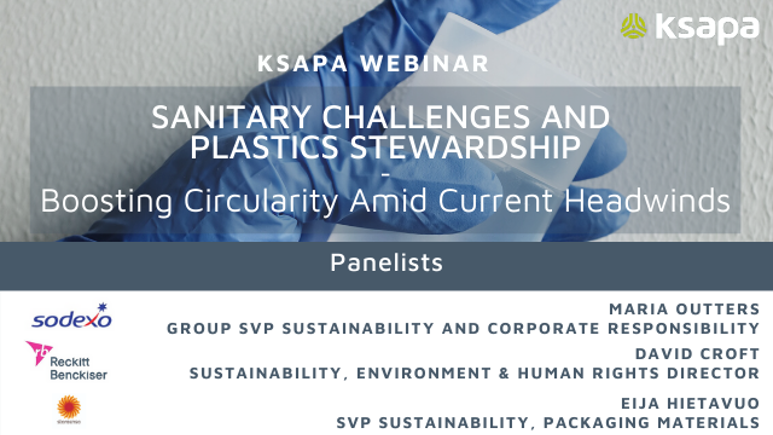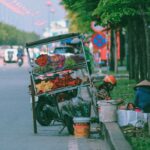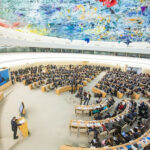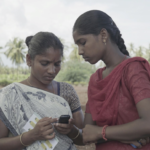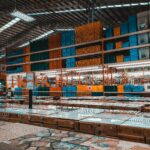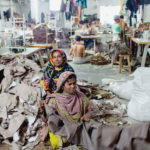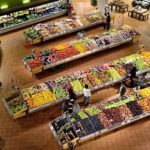Ksapa held a webinar including 130+ registered participants from Fortune-500 companies, investors and other critical stakeholders, with speakers from RB, Stora Enso and Sodexo. Here are a few takeaways.
Single-Use Plastic Could Have Grown by +300% in America With Covid-19
The Covid-19 crisis impacts our lives, communities and economies daily. Rightly or not, health concerns have encouraged a massive recourse to disposable protective gear. Since the outbreak of the pandemic, consumption of single-use plastic could have grown by as much as 300% in America, according to the International Solid Waste Association. Grand View Research meanwhile estimates the disposable-mask market could increase globally, from $800m in 2019 to $166bn in 2020. Though technically recyclable, health concerns dictate this surge of plastics be bound for landfill sites or incinerated. From there, they are likely swept whole in already fragile oceans or released into the air in the form of toxins, nano or micro-particles.
The question arises as to how to navigate contradictory injunctions among businesses and investors called upon to juggle the pandemic with pledges to circularity and plastics stewardship. Bearing in mind the stakes of the 2020 Delivery Decade, Ksapa organized a webinar to discuss challenges and solutions. We welcomed expert perspectives from Maria Outters (Group SVP Sustainability and Corporate Responsibility at Sodexo), David Croft (Chief Sustainability Officer at Reckitt Benckiser) and Eija Hietavuo (SVP Sustainability and Packaging Materials at Stora Enso).
Circularity, A Priority Too Few Take Seriously
The private sector has mainly focused on decoupling economic activity from resource usage, whilst delving into the corollary environmental impacts. New circular business models are emerging, which have targeted the 5 key levers, that are mainstreaming renewable materials, generalizing recycling, remanufacturing end-of-life products, sharing and leasing assets.
That said, industry has faced growing pressure by way of new regulations, media attention and public outcry regarding their reliance on petrochemicals. A recent survey among 50 leaders of the consumer goods industry pointed to a relative inaction on the plastic pollution front, despite highly-publicized corporate pledges. The As You Sow non-profit assessed business performance against issues ranging from product design to reusable packaging, recycled content, packaging data transparency and supporting recycling and extended producer responsibility. Whereas the strongest progress is apparently found in packaging design and recycled content, most stop short of mainstreaming packaging alternatives and none have a clear timeline to cut single-use plastics.
A major challenge stems from the fact plastic remains so cheap and convenient. Be it in China, South East Asia or OECD economies, governments, clients, consumers and other stakeholders are rapidly changing their perception of plastics, whereas changing industrial processes takes time, pertinent technologies and capital. To anticipate such demands, a number of public and B2B businesses have already banned plastics. With Covid-19, all that hangs in the balance.
3 SOLUTIONS TO BOOST CIRCULARITY AMID COVID-19 SANITARY CHALLENGES
For circularity to persevere amid Covid-19 sanitary challenges, Ksapa suggested 3 solutions targeting quality stakeholder dialog, based on a readable and credible adaptation trajectory that effectively juggles cost-cutting and corporate sustainability and circularity action plans.
1. Choosing Battles
In an increasingly resource-constrained world, carbon budgeting will indeed push stakeholders to challenge businesses overly reliant on petrochemicals. At Ksapa, we design and lead stakeholder engagement programs empowering our partners to identify where plastics remain acceptable. Our team otherwise provides them with the methodology to define elimination pathways.
Sodexo initially focused its circularity commitment in terms of preventing global food waste, by promoting bulk buffet and salads, while its plastics stewardship translates in distributing bags and cutlery by-request only, mainstreaming plastic-free dining solutions and phasing out single-use plastics. Though Covid-19 concerns justify returning to plastics under certain circumstances, Sodexo does not expect to roll back its commitments. While plastics must be allowed to return, the Group means to actively promote plant-based diets, mainstreaming alternatives for plastics as well as collection and recycling by way of lobbying for more regulation and infrastructure.
As Stora Enso sits upstream of the plastics battle, the company has chosen to promote the circular bio-economy. The Covid-19 crisis has driven home the importance of packaging and of plastics as a smart, efficient solution to safeguard health as well as food life.
Reckitt Benckiser prioritizes product integrity, acceptability and affordability. Its circularity commitment goes beyond reducing total material use or product and packaging design and rather delves more proactively into raw material imports and recycled feedstock for natural and chemical ingredients. Based on the understanding it cannot recycle its way out of the plastics crisis, the Group promotes plastic-free environments, optimizes pack-size to consumer use and promotes material efficiency, quality and reuse. Their approach is one of balancing their specific product and market mix, to enable access to plastics alternatives, varying upon the location and recyclability of products.
2. Investing in Innovative Models
At Ksapa, we develop innovative funding models to federate impact investors and industrial perspectives to share resources and mainstream alternative industrial technologies or packaging solutions to slash plastic usage. For instance, Sodexo only recently renewed a 1,3 billion revolving credit facility indexed on Group commitment to ending food waste, lending financial visibility to the underpinning efforts and cost and fostering internal engagement. At Ksapa we’re leveraging well tested as much as innovative financial engineering to change the game and access to the level of resources needed to deploy programs with scalable impacts.
That said, where the United Nations Sustainable Development Goals and OECD guidelines are concerned, the state-of-play is still seen to favor lenders over borrowers, regardless of preferential rates. Green finance could therefore do better through effective collaboration, from the moment financing solutions are designed. Indeed, the European Commission is working to embed sustainability requirements in its post-coronavirus recovery package, while collaborating with the private sector to ensure actual implementation on the ground.
3. Boosting Collaborations
At Ksapa, we share expertise with authorities, investors and businesses to converge on pertinent regulations, tax incentives, waste reduction and recycling programs, deriving learning from state-of-the-art practices to boost impact in the decade to come. Revamping the linear model upon which companies were built necessarily entails collaboration, to effectively close the loop in terms of the way they design products, use materials, engage with customers and understand how products will be disposed of. The scale of plastics overconsumption means business as usual cannot be allowed to prevail and pushes companies to consider product design and disposal before they are even made. Regularly pressure, with upwards of 90 plastic policies around the world, will otherwise come to force change upon them.
Another actionable solution involves working with collection points and consumers, by developing preexisting and new relations to incentivize and not just promote recycling, particularly when dealing with the informal economy of emerging countries. Indeed, consumers may be rewarded to do their part, by way of digital tools already present and massively leveraged by Sodexo among others. Taking a broader view to address the circular and plastics challenge, collaborations simplify supply management both directly and indirectly – in a way that make sense as a rapidly scalable solution and the for the long run. In that regard as well, collaboration is paramount for businesses and finance providers to support market development and transformation.
Conclusion: Progress Breaks Down at the Interface
Progress breaks down at the interface, as our webinar demonstrated by talking to three companies sitting at different points in the value chain. Businesses must indeed analyze what they buy and sell to secure what they pass on to the broader community, while shoring up their contribution for other players further down the value chain.
Ksapa teams stand at the ready to share further insights with the leading organizations across the board that listened in on our webinar. Joining our conversation on such sensitive and complex subjects as circularity and plastics stewardship where global businesses and investors the likes of PVH, Nike, BP, Unilever, Engie, Axa, Coca-Cola, Estée Lauder, Allianz, Sanofi, L’Oréal, Danone, Total, BNP Paribas, Hewlett-Packard Enterprises, Canon EMEA, De Beers, Sephora, Solvay, Volvo and Suez. They were joined among others by consultants, non-profits and academia from McKinsey, MSCI, Sustainalytics, the Danish Industry Forum, the OECD, the UNEP, the World Bank, the INSEAD Business School, the Oxford University Press, Forest Carbon, Action Contre la Faim and the World Animal Protection Society.
Replay here.
As a sustainability and corporate responsibility consultant, Margaux joined Ksapa with international experience in public, private and non-profit organizations. She had previously worked for the Deloitte and Quantis sustainability consultancies, lobbied for environmental research on behalf of the INRA and contributed to Total’s extra-financial reporting.
A Franco-American citizen, Margaux holds sustainability certifications from the IEMA and Centrale-Supélec on top of a Masters degree in History, Communications, Business and Internal Affairs.
She is fluent in French, English and Spanish.

